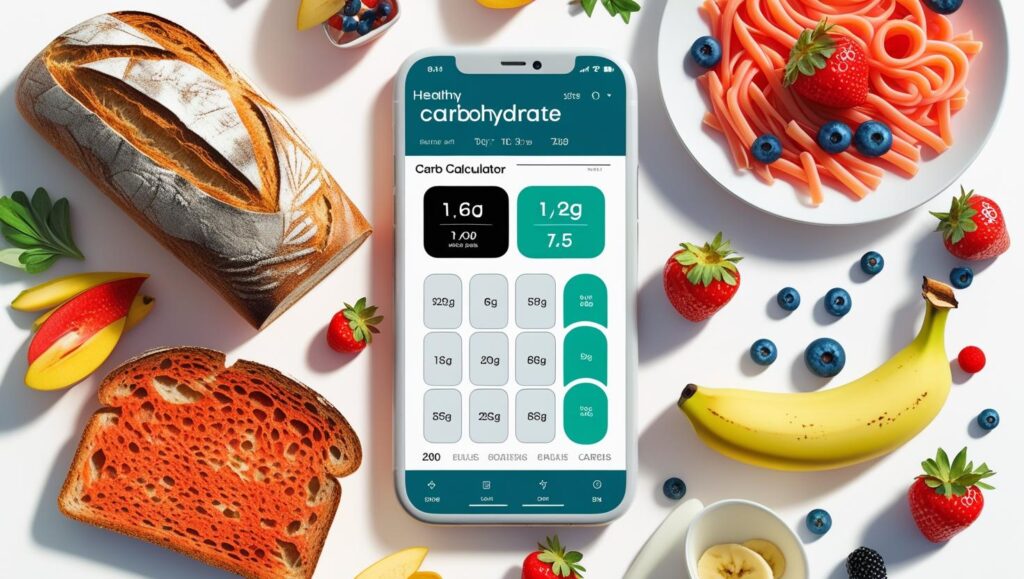How to Use Our Carbohydrate Calculator to Hit Your Daily Carb Goals
Health & Nutrition / Diet Planning / By NutriFitCalc Team
Introduction
Carbohydrates are one of the main sources of energy for the human body. They fuel the brain, muscles, and every cell. Yet, too many or too few carbs can affect weight, blood sugar, and overall health. That is why learning how to calculate and track your daily carbohydrate intake is essential.
A carbohydrate calculator is a simple tool that tells you how many grams of carbs you should eat daily based on your age, weight, activity level, and health goals. Whether you want weight loss, better performance in cycling, or blood sugar control as a diabetic, our calculator can help. In this guide, we explain what a carbohydrate calculator is, how it works, and how you can use it to hit your daily carb goals at home.

Track your carbohydrate intake with our easy-to-use calculator
What is a Carbohydrate Calculator?
A carbohydrate calculator is an online tool designed to help you determine your daily carbohydrate needs. It works by taking your weight, age, gender, and activity level to calculate how many grams of carbohydrates you should eat each day.
The key difference between counting calories and carbs is that calories measure energy as a whole, while carbs specifically track the portion of energy coming from carbohydrates. According to Harvard Health, 45–65% of your daily energy intake should come from carbohydrates.
Why Use a Carbohydrate Calculator?
Using a carbohydrate calculator at home gives you control over your diet and lifestyle.
- For weight loss: Helps plan a low-carb diet while ensuring balance.
- For athletes/cycling: Supports carb-loading strategies for better endurance.
- For diabetics: Helps manage carbohydrate intake to control blood sugar.
- For healthy living: Encourages balanced nutrition and portion control.
The American Diabetes Association highlights carb tracking as one of the most effective methods for blood sugar management.
Tools You Need to Track Carbohydrates
To calculate carbohydrates at home, you need just a few tools:
- Food labels: Packaged foods list carb content.
- Kitchen scale: Weigh portions for accuracy.
- Nutrition databases: USDA and online apps list carb values of foods.
- Carbohydrate calculator: Free tools like the Nutrifitcalc Carbohydrate Calculator simplify the process.
How to Use Our Carbohydrate Calculator (Step-by-Step)
Using Nutrifitcalc's carb calculator is easy and free.
- Enter your weight, age, and activity level.
- Select your goal (weight loss, maintenance, or performance).
- Click Calculate.
- Instantly see your daily carb target in grams.
This process ensures your diet is personalized to your lifestyle.
Try Our Carb CalculatorCarbohydrate Calculator Formula Explained
The general formula is based on recommended macronutrient distribution:
Daily Carbs (grams) = (Daily Calories × % of calories from carbs) ÷ 4
Example for male:
- Calories: 2500/day
- Carbs: 50% → (2500 × 0.50) ÷ 4 = 312 g carbs/day
Example for female:
- Calories: 1800/day
- Carbs: 45% → (1800 × 0.45) ÷ 4 = 202 g carbs/day
These ranges align with NIH guidelines.
Carbohydrate Calculator for Different Needs
Weight Loss
Lower carb intake can help reduce calorie consumption. Aim for 100–150 g/day depending on activity.
Cycling
Athletes need more carbs for energy. Cyclists may require 6–10 g per kg of body weight.
Diabetics
Tracking carbs helps manage blood sugar spikes. Balanced meals with controlled carbs are recommended.
UK & Australia
Nutritional guidelines may vary slightly, but calculators like Nutrifitcalc are valid globally.
Food Recipes
Helps calculate carbs in recipes. Add the carbs of each ingredient, divide by servings.
Pet Food
Even pet nutrition uses carb calculators to ensure balanced meals for cats, especially in veterinary diets.
Carbohydrate Calculator App Free
Mobile apps make carb tracking simple on the go. Popular apps allow barcode scanning and meal logging. However, many require premium subscriptions.
The MyFitnessPal app is one example, but free web tools like Nutrifitcalc are often faster and easier.
Tips for Hitting Your Daily Carb Goals
To make the most of your carb calculator results, follow these tips:
- Choose healthy carbs: Whole grains, fruits, vegetables, and legumes.
- Balance meals: Pair carbs with protein and fiber for better energy.
- Avoid empty carbs: Limit sugary drinks and processed foods.
- Track daily: Consistency improves results.
According to the Mayo Clinic, healthy carbs are essential for sustained energy and long-term wellness.
Calculate Your Carb NeedsFAQs
Most adults need 45–65% of calories from carbs. For a 2000-calorie diet, that is 225–325 g of carbs.
No. Choosing the right type and quantity matters more than cutting carbs completely.
Nutrifitcalc's free online calculator is easy, accurate, and accessible.
Yes, carb calculators are helpful for diabetics to manage daily intake.
Add up carbs in each ingredient, then divide by servings.
Conclusion
Carbohydrates are not the enemy of health. They are the body's primary source of energy. The key is to calculate and balance your daily carb intake according to your needs.
Our Nutrifitcalc Carbohydrate Calculator makes it easy to track carbs for weight loss, cycling, diabetes, or everyday health. With the right approach, you can hit your daily carb goals, stay energized, and maintain a balanced lifestyle.
Start Calculating NowDisclaimer
The information provided in this blog post is for general informational purposes only. It is not intended as medical advice, diagnosis, or treatment. Please consult a healthcare professional before making any significant changes to your health or fitness routine. The accuracy of carbohydrate calculations may vary based on individual factors.

There is visibly a lot to realize about this. I assume you made some good points in features also.